The iPad Air Review
by Anand Lal Shimpi on October 29, 2013 9:00 PM ESTBattery Life
With the iPad Air Apple moved to a 32.4Wh battery, a significant decrease from the 42.5Wh unit in the 3rd and 4th generation iPads. The smaller battery doesn’t come with a change to Apple’s claim of 10 hours of battery life, which implies a reduction in overall platform power. I confirmed a substantial reduction in platform power in my crude measurements earlier in the article. Although it’s possible for the iPad Air to draw substantially more power than the iPad 4, our earlier power data seems to imply that it’s unlikely given the same exact workload. Our battery life tests agree.
We'll start with our 2013 smartphone/tablet web browsing battery life test. As always all displays are calibrated to 200 nits. The workload itself is hidden from OEMs to avoid any intentional gaming, but I've described it at a high level here.
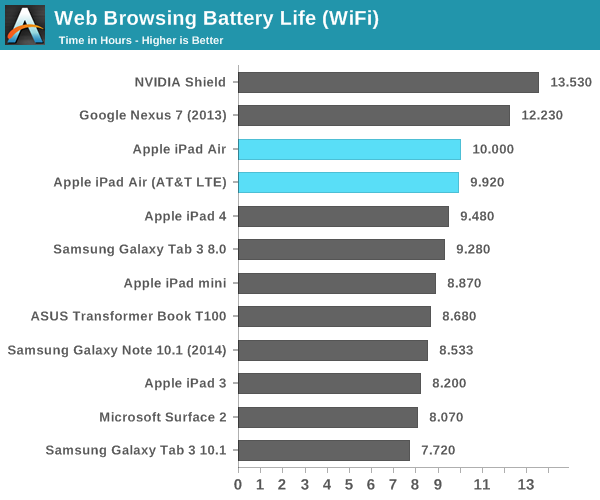
Our web browsing workload came in at exactly 10 hours of continuous usage - an improvement compared to the iPad 4. Battery life on LTE was good as well, consistently delivering just under 10 hours of usage. The fact that both LTE and WiFi tests deliver similar results tells me that we may be bottlenecked by some other component in the system (perhaps display?).
I've been running the same video playback test for a while now, although we're quickly approaching a point where I'll need to move to a higher bitrate 1080p test. Here I'm playing a 4Mbps H.264 High Profile 720p rip I made of the Harry Potter 8 Blu-ray. The full movie plays through and is looped until the battery dies. Once again, the displays are calibrated to 200 nits:
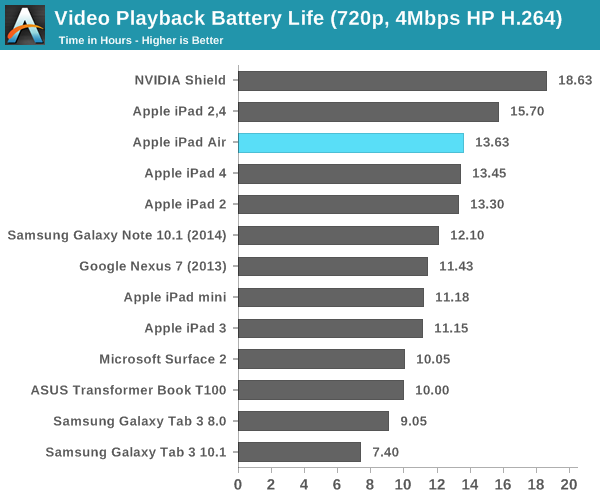
Video playback battery life also improves slightly compared to the iPad 4. Apple’s battery life claims aren’t usually based around video playback, so exceeding their 10 hour suggestion here shouldn’t come as a shock. Apple’s video decode power has always been extremely low.
Our final cross-platform battery life test is based on Kishonti's Egypt HD test. Here we have a loop of the Egypt HD benchmark, capped to 30 fps, running on all of the devices with their screens calibrated to 200 nits.
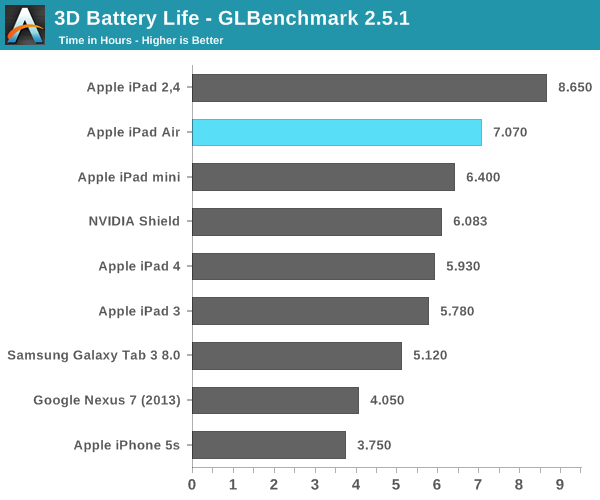
Our 3D battery life rundown test shows a substantial improvement in battery life over the iPad 4. IMG’s PowerVR G6430, running a moderate workload, can do so more efficiently than any of the previous generation GPUs in Apple’s SoCs. Much like the A7’s CPU cores however, there’s a wider dynamic range of power consumption with the G6430. Running at max performance I would expect to see greater GPU power consumption. The question then becomes what’s more likely? Since the majority of iOS games don’t target the A7 (and instead shoot for lower end hardware), I would expect you to see better battery life even while gaming on the iPad Air vs the iPad 3/4.
Charge Time
The iPad Air comes with the same 12W USB charger and Lightning cable that we first saw with the iPad 4. Having to only charge a 32.5W battery means that charge times are lower compared to the iPad 3 and 4:
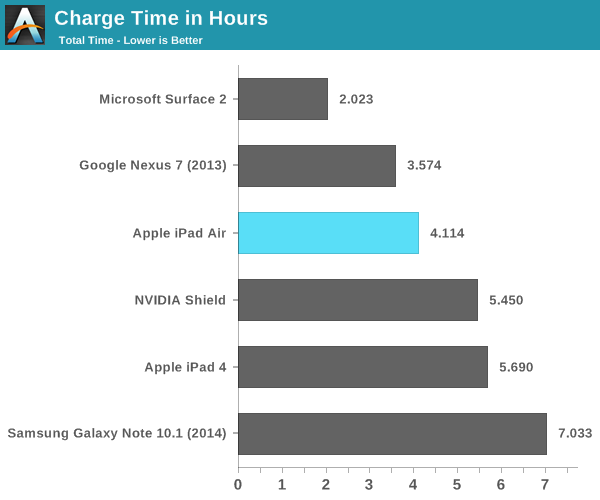
A full charge takes a little over 4 hours to complete. The adapter delivers as much as 12W to the iPad, drawing a maximum of 13.5W at the wall. I still think the sweet spot is somewhere closer to 2.5 hours but that’s another balancing game that must be played between charge time and maintaining battery health. It’s still so much better than the ~6 hours of charge time for the iPad 3 and 5.69 hours for the iPad 4.


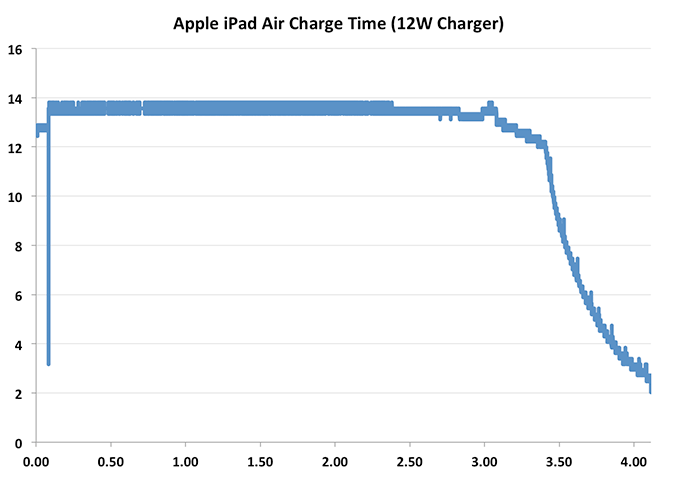








444 Comments
View All Comments
solipsism - Tuesday, November 5, 2013 - link
Spunjji wrote, "o, they're not, but even the most expensive NAND does not cost what Apple are charging."Why would you think they would sell it to you at their bulk component cost? Ridiculous!
Spunjji - Tuesday, November 5, 2013 - link
So what you're saying is that the economics of the situation justifies them fucking the consumer.That's cool, go with it. It's certainly their logic. I'm just reserving my right to call it bullshit.
solipsism - Tuesday, November 5, 2013 - link
Spunjji wrote, "So what you're saying is that the economics of the situation justifies them fucking the consumer."How are you being fucked by choosing whether to buy or not buy? You really need to read up on how a free market works.
ChrisHogg - Wednesday, October 30, 2013 - link
What is that background on the iPad Air? Can you please post the file or the link? Thanks.apaceeee - Wednesday, October 30, 2013 - link
1GB RAM is really deficient in reality. The more resolution it has, the more RAM it request. In fact, 1GB RAM is easily crashed in some APPs even if in iOS6.1.X, How about iOS7 ? I know the processes are false in the background, it's not Android. But the reality is many APPs will take much more RAM than we considered, even if a large PPT opened in QuickOffice HD Pro can crash. I can't believe that the HUGE-RAM-Taking can be fixed in iOS7 .Zoolookuk - Wednesday, October 30, 2013 - link
The 3Dmark physics score is explained as follows: The Physics test is uses Bullet, and practically the whole CPU time is spent in the soft body solver, PSolve_links. If you pull this function out of Bullet and bench it separately, you do see a 2x speed increase [over Swift]. However, once it's inside the physics engine, you see nothing.The result seems to be that if the soft bodies are arranged in memory so that the CPU can access them in a sequential fashion, you get a 2x to 3x increase in speed. This is higher if it can run up the memory, a bit lower if it runs down. The way bullet places the bodies in the memory is a lot more random and they are accesses in a jump-back-and-forth manner. When memory is accessed in this way, all speed gains are lost.
A6 shows none of this behaviour. It is realistic to assume that in the new A7 we see the new prefetch in action, but it cannot gain traction with a random memory access pattern.
Da W - Wednesday, October 30, 2013 - link
I JUST CAN'T STAND THOSE gSHEEPS and Nvidia FANBOIS that blast Anand everytime he posts a review on an Apple or AMD product.GET A FUCKING LIFE PEOPLE!
This is by far the best tech review website i've seen ANYWHERE on the web, and i find the guy goes out of his way to be as neutral and unbiased as one can be!
A good product is a good product. Just because you don't like the company (for whatever reason, as long as you don't work there or are not a stock holder you should just shut the fuck up) doesn't mean the reviewer is bad!
I also find most of these people are Google/Samsung zealots. I wonder if there's a secret google team that spoil anti-apple/microsoft shit everywhere on the web. they sure got the money, and they control the web. I've seen it in politics.
Look i'll make things simple:
1) Apple makes good product and tens of millions of people care about theses products and search the web for reviews for their latest products. Its only natural for a REVIEW SITE to post reviews on the topic.
2) It so happen that AMD's GPU are not pure crap. They heat more than Nvidia this generation, but cost less, they ARE an alternative.
3) I've seen reviews of Windows and Surface on day one here on Anandtech. The review is usualy on par with the market: cute, but doesn't sell.
4) Anandtech usually praise Samsung, HTC and other Android products too.
So all of you people, GET A LIFE. Or a challenge you to build a review site more unbiased that this one. Do it yourself and stop crying.
tipoo - Wednesday, October 30, 2013 - link
A lot of disgruntled iPad 1 owners will tell you lack of RAM is it's achilles heel, I hope this 30% increase in its RAM use with no increase in capacity doesn't hurt it.People saying Mavericks like compression will help: Anand measured how much RAM was in use under load. If it was compressing something, it would have been factored into how much was used. This is no holy grail here.
Justin216 - Wednesday, October 30, 2013 - link
The problem was that the original iPad's memory was somewhat anemic from the get-go, even for the limited apps that were available at release.Since I've yet to have any memory issues on my 5s (iOS7 seems to do pretty good memory management, better than iOS6 did for me on my iP5), so I don't anticipate I'll have any with a new iPad Air.
Would I have liked more? Yep. Should they have added more? Probably. I'm just not overly put off by it having 1GB RAM. Reality is, app devs work within their hardware constraints, and make great use of the specs they have. We've had the Xbox 360 on the market, what, 8 years? It has 512MB RAM, and developers still managed to make great software under those constraints. Apples to oranges there of course, but the basic concept still stands.
Now, if we were talking flagship Android tablets, I'd never buy one with 1GB RAM. For several technical reasons, Android is RAM hungry, and the general experience improves dramatically with more RAM.
Kvaern - Wednesday, October 30, 2013 - link
Time will show if the airpad will become obsolete prematurely because of its ram but those disgruntled iPad 1 users apparently fail to realize you don't both get to be a tech pioneer and get product longevity.